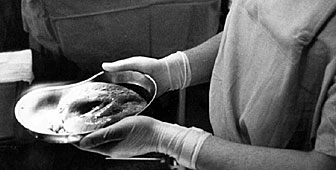Organ donations remain taboo

Switzerland is holding its national organ donor day on Saturday. However, despite numerous publicity campaigns, fewer Swiss than ever are donors.
Last year, 1,030 people were on waiting lists to receive a replacement organ, but just 424 of them had a transplant. According to Swisstransplant, the national coordination centre, 32 others died while waiting for a transplant.
The organ donor day, which is also being held in Germany and France, will try to hammer home the fact that no one can exclude the possibility that at some stage in their lives they may need a donor organ.
A recent survey by the Coop magazine showed that 43 per cent of the Swiss population are prepared to donate their organs before they die or after their death. Another 31 per cent said they would do so only after death. Almost one in five said they would never agree to become a donor.
Low number of donors
However, the reality is that only 13 out of every million people in Switzerland are donors. This ranks Switzerland alongside Germany and the Netherlands as one of the least willing donor nations in Europe. The situation is only slightly better in France where there are 17 donors for every million.
Swisstransplant is responsible in Switzerland for organ donations and issuing information to the public. It says only around 15 per cent of the Swiss population are well informed about the subject.
The figure is surprising since the issue has been in the public eye over the last few years. Parliament has hotly debated the issue and the Swiss themselves voted to empower the federal government concerning transplant laws.
At the moment laws differ from canton to canton. In some cantons, organs can only be removed if the donor gives permission before death. In other cantons, organs can, in theory, be used for transplants unless the affected person or next of kin explicitly say no.
A proposed federal law on transplants – if passed by parliament – would clarify the situation.
Donor database
Transplant specialists stress there has to be greater awareness among the public. While organ donor cards exist, they are not widespread among the public.
Furthermore, the decision as to whether someone’s organs can be used for a transplant still lies mainly with the deceased person’s relatives.
“There isn’t enough information about organ donation,” said Daniel Candinas, head of the transplant unit at Bern University hospital. “Potential donors need that information to talk with their relatives and to avoid a huge amount of stress in case of an untimely death.”
Specialists face a mighty task to convince ordinary citizens to give up their organs should they die. There have also been calls for a national donor database, but this has encountered opposition from politicians and doctors alike.
Trix Heberlein, the president of Swisstransplant and a Radical Party member of the House of Representatives, believes the money for such a database would be better spent elsewhere.
High costs
“A database would cost several million francs per year,” she told swissinfo. “People would also hesitate to register, because they could be afraid the information they give would be misused.”
Candinas also has his doubts about whether a national database is an appropriate measure. “No database is going to replace what people feel in their hearts,” he said. “It isn’t necessarily the ideal way forward, because you need to touch people in their hearts to convince them.”
Another problem with a database would be keeping it up to date, especially if potential donors changed their minds.
However, not everybody thinks that a proper database is a waste of time, energy and money. Pascal Beer-Lilla lost her teenage son in an accident five months ago and is convinced that proper registration of organ donors can help many more people.
“Denis was 18 years old,” she said. “But we knew a long time ago that he wanted to donate his organs if something happened.”
“We told the hospital this and they took seven different ones for people in Switzerland or Europe.”
Tomorrow too late
Beer-Lilla has launched a project called “Pass the Relay”, which aims to create a donor card linked to a proper nationwide database.
“You have to choose today, because tomorrow is too late,” she told swissinfo. “It’s very difficult for a family to take a decision in a few hours, and it’s a dramatic situation if you’ve lost a loved one.”
Transplants don’t just help to extend patients’ lives. They also help to ease the financial burden on the health system, according to Swisstransplant.
“A kidney transplant costs SFr50,000 all included, while dialysis for renal insufficiencies already costs SFr70,000 per year,” said Philippe Morel.
The numbers for a liver transplant are even more telling according to Morel. A transplant may cost SFr120,000, but the same patient who does not undergo the surgery will cost double that sum in healthcare costs before he or she dies.
swissinfo/Scott Capper

In compliance with the JTI standards
More: SWI swissinfo.ch certified by the Journalism Trust Initiative








You can find an overview of ongoing debates with our journalists here . Please join us!
If you want to start a conversation about a topic raised in this article or want to report factual errors, email us at english@swissinfo.ch.